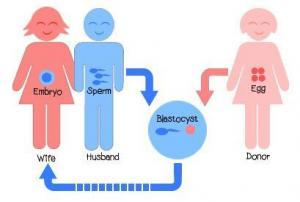Maybe you’ve seen a Facebook ad or a flyer. Perhaps you’ve overheard a conversation on the topic.
But what exactly is egg donation? We break it down for you.
Put a label on it
Simply put, egg donation is when one woman donates some of her eggs to another woman with one goal in mind – to make healthy babies!
There are a number of reasons for hopeful parents to choose an egg donor. Perhaps they’ve struggled to conceive using the woman’s own eggs. Perhaps there’s a medical reason or genetic condition in play. And perhaps you’re donating to a single dad or a gay couple.
Whatever the reason, the recipient has usually gone down a long, hard road before they get to you, and your hugely generous donation could be what finally allows them to achieve their dream of becoming parents!
The nitty gritty
Unfortunately, not everyone can donate their eggs. Women must be between the ages of 19 and 32, have a healthy BMI, and not have any serious medical conditions, genetic disorders, or sexually transmitted diseases (including HIV). Recreational drugs are also a no.
Egg donations are completely anonymous and handled through an agency or clinic. You won’t meet the intended parents or know each other’s names, and they won’t see any adult pictures of you.
The intended parents will read your donor profile to get to know your medical history, your family’s medical history and, perhaps most importantly, the type of person you are. Think of it as the world’s most in-depth dating profile! They will also see the gorgeous baby and kiddie photos that you provide to them – so make sure your kiddie pics are ultra-cute!
Donors are compensated R7000 for their time and effort – and it’s a BIG commitment. You will need to be prepared to inject yourself every day for around two weeks, take or change birth control to sync your menstrual cycle with the recipient’s, and make yourself available for scans and check-ups throughout the process.
All right, sounds good. I’m in.
Great! Once you’ve filled out your epic donor profile and submitted your baby pics, you’ll meet with your new Nurture BF for an initial interview to talk you through the process and make sure you’re not an axe murderer before you’re put on The List to be matched with a recipient.
Once you’ve matched, you’ll be assigned a clinic and a doctor, go for a medical exam, and meet with a psychologist to further assess your suitability as a donor.
You’ll be put on the Pill (if you’re not already on it) to match your menstrual cycle up with the recipient before you start your injections.
These are a relatively low dose of fertility medication used to stimulate your healthy ovaries to produce more eggs. You’ll need to inject yourself for between 10 to 14 days, depending on your doctor’s instructions, and they’ll throw in some additional injections to stop you from spontaneously ovulating and wasting all of those beautiful eggs.
And don’t worry if this is a lot of info – your amazing clinic team will walk you through everything!
Speaking of, you’ll need to pop in to the clinic every few days for a vaginal ultrasound with the doctor to make sure everything is as it should be, which is a great time to ask all the questions on your mind!
The Big Day
On retrieval day, you’ll be put under a light anaesthetic while you undergo something called “ultrasound directed needle aspiration”. During this process (for which you are asleep!) the doctor will use an ultrasound to direct a needle through the upper bit of your vagina and into your ovaries to “vacuum” those ripe eggs out.
You’re sent back to recovery and monitored for an hour or two before you receive your compensation and a cup of tea and are allowed to be taken home.
Then what?
Congratulations, you’re done! Go home and rest. Watch cheesy movies, have a nap, eat chocolate, pamper yourself. You’ve earned it!
The next day you can hop, skip or jump your way back to your normal life knowing that you’ve given the greatest gift anyone could ever give – the gift of hope.
Behind the scenes, your eggs are immediately examined and placed in a special culture medium where they remain for around three hours before semen is added to fertilise the eggs. An embryo transfer to the recipient’s womb usually takes place after the embryos have grown in the lab for three to five days, where they’ll (fingers crossed!) blossom into healthy babies and a happy parent!
Right, I’m definitely in.
Great! Head on over to https://www.nurture.co.za/donor-application/ and get going with your homework!
